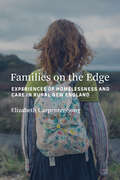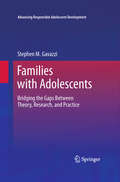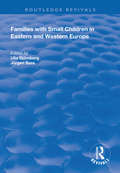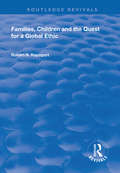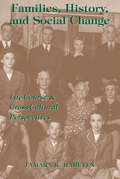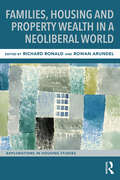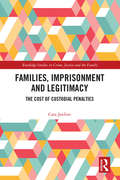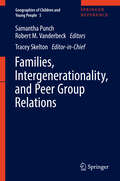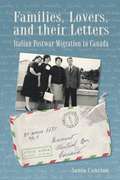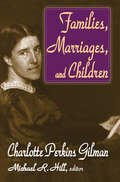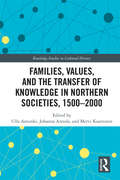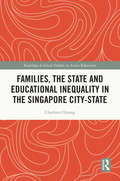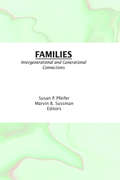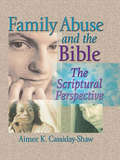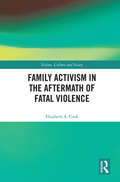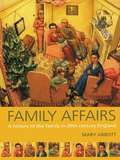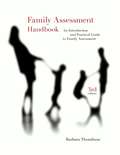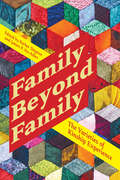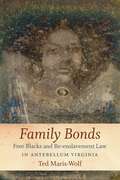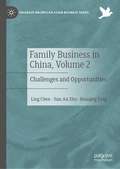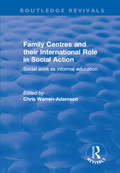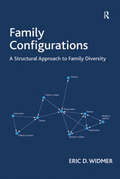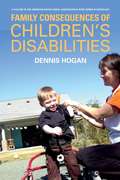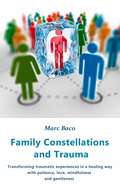- Table View
- List View
Families on the Edge: Experiences of Homelessness and Care in Rural New England (Culture and Psychiatry)
by Elizabeth Carpenter-SongAn intimate account of rural New England families living on the edge of homelessness, as well as the practices and policies of care that fail them.Families on the Edge is an ethnographic portrait of families in rural and small-town New England who are often undercut by the very systems that are set up to help them. In this book, author and medical anthropologist Elizabeth Carpenter-Song draws on a decade of ethnographic research to chart the struggles of a cohort of families she met in a Vermont family shelter in 2009, as they contend with housing insecurity, mental illness, and substance use. Few other works have attempted to take such a long-term view of how vulnerability to homelessness unfolds over time or to engage so fully with existing scholarship in the fields of anthropology and health services.Research on homelessness in the United States has been overwhelmingly conducted in urban settings, so much less is known about its trajectory in rural areas and small towns. Carpenter-Song&’s book identifies how specific aspects of rural New England—including scarce affordable housing stock, extremely limited transportation, and cultural expectations of self-reliance—come together to thwart opportunities for families despite their continual striving to &“make it&” in this environment. Carpenter-Song shines a light on the many high-stakes consequences that occur when systems of care fail and offers a way forward for clinicians, health researchers, and policymakers seeking practical solutions.
Families with Adolescents
by Stephen GavazziThis book focuses a unique panoramic lens on the study of adolescent development. It offers a clear blueprint for more consistently improved practice, emphasizing family process and structure instead of individual developmental stages.
Families with Small Children in Eastern and Western Europe (Routledge Revivals)
by Ulla Björnberg Jürgen SassPublished in 1997, the aim of this study is to address comparative perspectives on gender and family life in western and eastern Europe. The focus is on the way in which family policy measures relating to the reconciliation of work and family are viewed and used by employed parents with small children. Another purpose is to consider how compatibility between family and employment is perceived by the parents, and its implications for partnership, gender balance, and parent-child relationships. The book also discusses the consequences and lessons which can be drawn from these studies for the purpose of family policy initiatives.
Families, Children and the Quest for a Global Ethic (Routledge Revivals)
by Robert N. RapoportPublished in 1997, this volume looks at the role of families in the world order and the problems facing them especially in the face of globalization. The author takes into account materialist, religious, gender and environmental concerns.
Families, History And Social Change: Life Course And Cross-cultural Perspectives
by Tamara K HarevenOne of the prevailing myths about the American family is that there once existed a harmonious family with three generations living together, and that this "ideal" family broke down under the impact of urbanization and industrialization. The essays in Families, History, and Social Change challenge this myth and provide dramatic revisions of simplistic notions about change in the American family. In these interdisciplinary essays that are deeply rooted in history, Hareven provides important perspectives on family relations in the present, dispels myths about family relations in the past, offers new directions in research and interpretation, and revises our understanding of social change. Hareven's essays, which are based on thirty years of research, combine empirical evidence with theoretical frameworks and discussions of the state of the art in this exciting field. The essays cover a wide spectrum of issues and topics such as the organization of the family and the household, the networks available to children as they were growing up, the role of the family in the process of industrialization, the division of labor in the family along gender lines, and the relations between the generations in the later years of life. Coincidentally, the essays revolve around three central themes: The family's interaction with the process of industrialization, the life course, and the development of the field of family history--and its future directions. They are both interdisciplinary and cross-cultural.Professor Hareven is a pioneer and leader in the development of the field of family history. Her work makes a major contribution to the theoretical and substantive aspects of scholarship on family life, past and present, and on social change. Her essays also provide a fine understanding of this field's development.
Families, Housing and Property Wealth in a Neoliberal World (Explorations in Housing Studies)
by Richard Ronald Rowan ArundelThe twenty-first century has so far been characterized by ongoing realignments in the organization of the economy around housing and real estate. Markets have boomed and bust and boomed again with residential property increasingly a focus of wealth accumulation practices. While analyses have largely focussed on global flows of capital and large institutions, families have served as critical actors. Housing properties are family goods that shape how members interact, organise themselves, and deal with the vicissitudes of everyday economic life. Families have, moreover, increasingly mobilized around their homes as assets, aligning household transitions and practices towards the accumulation of property wealth. The capacities of different families to realise this, however, are highly uneven with housing conditions becoming increasingly central to growing inequalities and processes of social stratification. This book addresses changing relationships between families and their homes over the latest period of neo-liberalization. The book confronts how transformations in households, life-course transitions, kinship and intergenerational relations shape, and are being shaped by, the shifting role of property markets in social and economic processes. The chapters explore this in terms of different aspects of home, family life and socioeconomic change across varied national contexts.
Families, Imprisonment and Legitimacy: The Cost of Custodial Penalties (Routledge Studies in Crime, Justice and the Family)
by Cara JardineThis book examines what it means to be a family within the restrictive, disruptive, and often distressing context of imprisonment. Drawing on original qualitative data, it looks beyond traditional models of the family to examine the question of which relationships matter to individuals affected by imprisonment, and demonstrates how family relationships are actively constructed and maintained through family "practices" and "displays" such as visits, shared experiences and continuing family memories and traditions. It sheds new light not only on the true extent of who is impacted by the imposition of a prison sentence, but also the barriers to family life that these individuals encounter throughout its duration.This book also contributes to our understanding of wider issues such as poverty and social marginalisation, the role of family relationships on desistance from crime, and legitimacy. It argues that the act of supporting an individual in custody can bring families into regular contact with the criminal justice system in ways that can be both distressing and problematic, and therefore contends that the prison system should minimise the damage caused by imprisonment not only to family relationships, but also to the perceived legitimacy of the criminal justice system.Generating new conceptual insights into the harms of imprisonment and how perceptions of legitimacy and fairness are shaped by the criminal justice system, this book will be of much interest to students of criminology and sociology engaged in studies of criminal justice, prisons, gender, social work, and punishment. It will also be of interest to policy makers, penal-reformers, and activists.
Families, Intergenerationality, and Peer Group Relations
by Tracey Skelton Samantha Punch Robert M. VanderbeckThis volume addresses children and young people’s relationships both within and beyond the context of the family. It begins with familial relationships and the home by examining the social and cultural complexities of families, intimacies and interdependencies, including the dynamics of families as spatial units (nuclear, multi-generational, alternative) and the roles that children play (as carers etc.). In addition to considering child/parent relations, sibling relationships and birth order, the initial section includes particular dimensions of children's familial relationships in diverse contexts, such as family food practices, aspirations and work practices. The second section explores geographical dimensions of adult/child relationships beyond the dynamics of the family and across the lifecourse. It considers the roles that intergenerationality plays in children's and young people's lives as well as their links with wider communities. The section addresses broader conceptual issues and themes (child-adult relationships outside the home; intergenerational geographies and spaces; and the intergenerational city) while also providing more focused discussions of current issues related to the geographies of intergenerationality including adoption, looked after children and fertility. The final section addresses children and young people's relationships with one another: friendship, peer group relations, and sexualities. It explores the geographies and spatialities of affective relations and emotional practices among children and young people. Geographies of bodies and embodiment and their connection to identities is an important part of this section. The chapters range from cross-cultural comparisons of age mixing among children to specific kinds of relationship formations between children and young people (e.g. friendship; sexual relations; gangs; bullying) and the spaces and places (including cyberspace) that facilitate, impede and organise these relationships. The diverse relationships that children and young people form with both one another and with adults have significant geographical dimensions.
Families, Lovers, and their Letters: Italian Postwar Migration to Canada (Studies in Immigration and Culture #4)
by Sonia CancianFamilies, Lovers, and their Letters takes us into the passionate hearts and minds of ordinary people caught in the heartbreak of transatlantic migration. It examines the experiences of Italian migrants to Canada and their loved ones left behind in Italy following the Second World War, when the largest migration of Italians to Canada took place. In a micro-analysis of 400 private letters, including three collections that incorporate letters from both sides of the Atlantic, Sonia Cancian provides new evidence on the bidirectional flow of communication during migration. She analyzes how kinship networks functioned as a means of support and control through the flow of news, objects, and persons; how gender roles in productive and reproductive spheres were reinforced as a means of coping with separation; and how the emotional impact of both temporary and permanent separation was expressed during the migration process. Cancian also examines the love letter as a specific form of epistolary exchange, a first in Italian immigrant historiography, revealing the powerful effect that romantic love had on the migration experience.
Families, Marriages, and Children
by Charlotte Perkins GilmanCharlotte Perkins Gilman (1860-1935) was a pioneering sociologist, feminist pragmatist, author, and lecturer. A skilled and perceptive writer, she explained sociological concepts and principles clearly and concisely to popular audiences. This volume presents a focused and provocative set of Gilman's penetrating analyses of marriage, motherhood, and family relationships. Generally unavailable, except in archives and special libraries, the lion's share of the analyses are drawn directly from Gilman's quintessentially unique self-published journal, The Forerunner. Transcending her era, Gilman speaks with wit, insight, and candor to twenty-first century readers about many controversial aspects of family and family life. She believes deeply that women's values-regeneration, cooperation, and compassion-make for better societies. Men's values, she concludes, are destructive, competitive, and often violent. Families produce double standards and inequalities between husbands and wives, resulting in inferior mothers and, as a direct consequence, in substandard children. To improve society, Gilman argues, we need healthy, happy children. This requires well-trained, competent mothers, widespread social parenting, and enlightened, non-patriarchal marriages. Largely self-taught, Gilman supported herself through writing and lecturing. She was at one time a settlement house leader and an active member of the American Sociological Society. Her wide sociological circle included lasting friendships with Jane Addams, Edward A. Ross, and Lester F. Ward.
Families, Values, and the Transfer of Knowledge in Northern Societies, 1500–2000 (Routledge Studies in Cultural History #66)
by Ulla Aatsinki Johanna Annola Mervi KaarninenThis edited collection sheds light on Nordic families’ strategies and methods for transferring significant cultural heritage to the next generation over centuries. Contributors explore why certain values, attitudes, knowledge, and patterns were selected while others were left behind, and show how these decisions served and secured families’ well-being and values. Covering a time span ranging from the early modern era to the end of the twentieth century, the book combines the innovative "history from below" approach with a broad variety of families and new kinds of source material to open up new perspectives on the history of education and upbringing.
Families, the State and Educational Inequality in the Singapore City-State (Routledge Critical Studies in Asian Education)
by Charleen ChiongFocusing on Singapore’s education system from an equity perspective, Chiong’s book describes the often unheard perspectives of socio-economically disadvantaged families in Singapore. The performance of Singaporean students on international education benchmarking tests has been widely recognised. Relatively less known is how socio-economically disadvantaged families negotiate Singapore’s highly competitive, stratifying and meritocratic system. Yet, families’ perspectives can provide crucial insight in understanding how policy is ‘lived’ and experienced, and its effects on people’s lives. Drawing on 72 interviews with 12 families, this book traces the development of surprisingly close, collaborative relations between the state, schools and families on Singapore’s socio-economic margins. It demonstrates that in the 'strong' state of Singapore, families’ dependency on schools and the state facilitates the internalisation of individual and familial responsibility for future success. However, these very processes can injure, and perpetuate inequality. The analysis presented in this book has relevance in other contexts, in times where advanced capitalist states face growing inequalities and challenging relationships between institutional authority and the wider populace. As socio-economic and educational inequalities widen, this book asks timely questions and provides recommendations on what a more equitable state-citizen compact might look like. The book will appeal to researchers and students who are interested in the fields of the sociology and politics of education, social policy, and Asian culture and society.
Families: Intergenerational and Generational Connections
by Marvin B Sussman Susan K PfeiferThis special volume is devoted to the synthesis and review of theoretical and conceptual approaches associated with familial and non-familial connections across the life span. An important book as society “returns to the family,” it compares and contrasts different disciplinary perspectives associated with intergenerational relationships. Because intergenerational relationships have been the focus of research in many disciplines, various perspectives have emerged about kin and non-kin connections. Renewed interest in families and familial connections is due largely to events and situations occurring in complex, modernized societies which place the intergenerational nexus on center stage. The leading researchers represented in this outstanding book provide rare opportunity for the scholarly comparison of the various perspectives in the broader spectrum of family relations.Families: Intergenerational and Generational Connecting is a significant addition to the body of research on family connections. The three major areas of generational and intergenerational connections include theoretical and conceptual perspectives, connections within the family, and connections outside the family. As the use of families as support networks for individual members increases, this timely book will be an invaluable aid to educators, students, and researchers concerned about families and familial and non-familial relationships. Counselors and therapists will value this enlightening book with its diverse theoretical and conceptual perspectives on kinship, intergenerational solidarity and relations, social supports, and cross-national perspectives on family connections.
Family Abuse and the Bible: The Scriptural Perspective
by Harold G Koenig Aimee K Cassiday-ShawLearn the fundamental distinctions with this thoughtful study of Christ-ordained marriage!This unique volume reconciles a Biblical interpretation of marriage with the reality of domestic violence. Designed to raise awareness of abuse issues within the born-again community, Family Abuse and the Bible: The Scriptural Perspective works to promote the genuine sanctity of marriage and headship of the husband by examining the ways this God-given position can be subverted by Satan. It combines close Biblical exegesis with psychological insight into the effects of verbal, sexual, physical, and spiritual abuse. Family Abuse and the Bible offers new hope to conservative Christian women in abusive relationships. It demonstrates that abuse is not the will of God and that submission to violence is actually giving in to demonic forces. The tools in this book can ultimately free them from the horror of an abuse they may feel is ordained by God, while leaving them with an intact source of strength in their faith. Secular therapists and counselors will find Family Abuse and the Bible an essential resource that can help them remain sensitive to the needs of abused Christian women. This book explains conservative Christian beliefs about marriage, while providing powerful Biblical justifications that will reach Christian clients when secular ideas fail.Family Abuse and the Bible offers a clear-sighted Scriptural interpretation of domestic violence issues, including: the link between drugs and demonic possession the ways abusers twist the Scriptures to justify their ungodly actions the cycle of violence the role of repentance and forgiveness the difference between Biblical headship and abuseThis book is an essential tool for pastors, Christian counselors, and family therapists who work with Christian clients and also for husbands and wives who want the Lord&’s will for their marriage.
Family Activism in the Aftermath of Fatal Violence (Victims, Culture and Society)
by Elizabeth A. CookFamily Activism in the Aftermath of Fatal Violence explores how family and family activism work at the intersection of personal and public troubles and considers what influence family testimonies of fatal violence can have on matters of crime, justice, and punishment. The problem of fatal violence represents one end of a long continuum of violence that marks society, the effects of which endure in families and friends connected through ties of kinship, identity and social bonds. The aftermath of fatal violence can therefore be an intensely personal encounter which confronts families with disorder and uncertainty. Nevertheless, bereaved families are often found at the forefront of efforts to expose injustice, rouse public consciousness, and drive forward social change that seeks to prevent violence from happening again. This book draws upon ethnographic research with those bereaved by gun violence who became involved in family activism in the context of fatal violence: namely, the attempts by bereaved families to manage their experiences of violent death through public expressions of grief and become proxies for wider debates on social injustice. This is an ever more pressing issue in a landscape which increasingly sees the delegation of responsibility to families and communities that are left to deal with the aftermath of violence. An accessible and compelling read, this book will appeal to students and scholars of criminology, sociology, cultural studies, and all those interested in learning more about the after-effects of fatal violence.
Family Affairs: A History of the Family in Twentieth-Century England
by Mary AbbottThe decades between the close of World War I and the end of the Thatcher era have changed and challenged family life in England dramatically. The Depression and World War II shifted priorities and behaviour, as did the Welfare State, the Pill and Women's Lib later on. What threatened a family's respectability in the 1920s is often commonplace today - abortion, contraception, the single parent family, or gay relationships. Family Affairs explores the secret life of English families from 1920 to 1990. Mary Abbott takes the reader into her subjects' homes and hearts and provokes readers to reflect on families past and speculate on families future. A product of intense original research of primary and secondary sources, this volume is a useful contribution to the history of the family.
Family Assessment Handbook: An Introductory Practice Guide to Family Assessment
by Barbara ThomlisonFAMILY ASSESSMENT HANDBOOK: AN INTRODUCTORY PRACTICE GUIDE TO FAMILY ASSESSMENT, Third Edition, will prove to be an immensely helpful book whether you're preparing for a career working with families, or you just want to increase your knowledge of family sociology. With a focus on how to conduct a family assessment for case intervention, this practical guide offers a step-by-step approach to family practice. Fascinating family case studies demonstrate the process of assessment and selected interventions for working with diverse families. The Third Edition includes numerous resources to help readers develop evidence-based practice competencies, attitudes, and skills that support assessment of diverse family systems.
Family Attachment and the Decision to Move by Race
by Antonio Spilimbergo Luis UbedaA report from the International Monetary Fund.
Family Beyond Family: The Varieties of Kinship Experience
by Parker Shipton and James P. Ito-AdlerArguably all humans invent or accept forms of family beyond those that are close biological kin. These fictive forms of kinship may vary across diverse cultures and serve different purposes. This book explores a wide variety of such kinship-forming, from expedient daylong pseudo-marriages to notions of deities as everlasting parents for humankind and life on earth. These range from the purely abstract to the bricks and mortar of college fraternities and sororities. Family Beyond Family observes and examines the principles and purposes of such fabricated connections.
Family Bonds
by Ted Maris-WolfBetween 1854 and 1864, more than a hundred free African Americans in Virginia proposed to enslave themselves and, in some cases, their children. Ted Maris-Wolf explains this phenomenon as a response to state legislation that forced free African Americans to make a terrible choice: leave enslaved loved ones behind for freedom elsewhere or seek a way to remain in their communities, even by renouncing legal freedom. Maris-Wolf paints an intimate portrait of these people whose lives, liberty, and use of Virginia law offer new understandings of race and place in the upper South. Maris-Wolf shows how free African Americans quietly challenged prevailing notions of racial restriction and exclusion, weaving themselves into the social and economic fabric of their neighborhoods and claiming, through unconventional or counterintuitive means, certain basic rights of residency and family. Employing records from nearly every Virginia county, he pieces together the remarkable lives of Watkins Love, Jane Payne, and other African Americans who made themselves essential parts of their communities and, in some cases, gave up their legal freedom in order to maintain family and community ties.
Family Business in China, Volume 2: Challenges and Opportunities (Palgrave Macmillan Asian Business Series)
by Ling Chen Jian An Zhu Hanqing FangUnlike other economies, family businesses in China are greatly affected by the derived Confucian culture, excessive marketization, as well as the seemingly endless institutional supervision by a transitional Chinese government. China has a strong historical legacy, devoted to patriarchal values and strong family-centered traditions.This volume discusses the current status, upcoming challenges, and future prospects for family businesses in China. It explores unique organizational characteristics that are associated with Chinese family firms, such as being entrepreneurial, having concentrated power in the hands of the family business owners, and extensive family and semi-family involvement in the business. It also discusses shared features of strategic actions among Chinese family firms that include technology innovations, diversification, and internationalization, as well as the political connections that Chinese family firms often have. This book offers researchers a comprehensive overview of small family firms that are likely to be home-based microenterprises as well as large publicly traded business groups that are frequently owned by business families.
Family Centres and their International Role in Social Action: Social Work as Informal Education (Routledge Revivals Ser.)
by Chris Warren-AdamsonThis title was first published in 2001: Family centre practice is one of the success stories of the past twenty years. As well as contributing creative ideas to centre practice this important edited collection highlights the role of practitioners as developmental or informal educationalists. International contributors challenge care management in child protection as the dominant discourse in child care social work and instead advance integrated practice in the internationally developing role of family centres as a more authentic and hopeful practice for children and families. The contributors outline ways of avoiding reductionism - social work reduced to a protective and assessment role - and show how socially inclusive practice can be sustained with very marginalized families. The book argues that there is a need for the social work training curriculum to emphasize social work's debt to social and informal education, and concludes with a call for an international forum of family centre practice.
Family Configurations: A Structural Approach to Family Diversity
by Eric D. WidmerFamily Configurations develops current scholarship on families and intimate lives by demonstrating that family relationships, far from being fluid and inconsequential, are more structured and committed than ever. Based on a series of empirical studies carried out in the US and Europe, this volume reveals the diversity of family relationships that emerge as a result of various key family issues, emphasizing the supportive and disruptive interdependencies existing among large sets of family members beyond the nuclear family. By applying social network methods to uncover the relational patterns of contemporary families, and making use of rich empirical data, this book draws on recent developments in family sociology, social network analysis and kinship studies to present a fascinating interdisciplinary approach to the family.
Family Consequences of Children’s Disabilities
by Denis P. HoganThe Americans with Disabilities Act (ADA) and other national policies are designed to ensure the greatest possible inclusion of people with disabilities in all aspects of American life. But as a matter of national policy we still place the lion's share of responsibility for raising children with disabilities on their families. While this strategy largely works, sociologist Dennis Hogan maintains, the reality is that family financial security, the parents' relationship, and the needs of other children in the home all can be stretched to the limit. In Family Consequences of Children's Disabilities Hogan delves inside the experiences of these families and examines the financial and emotional costs of raising a child with a disability. The book examines the challenges families of children with disabilities encounter and how these challenges impact family life. The first comprehensive account of the families of children with disabilities, Family Consequences of Children's Disabilities employs data culled from seven national surveys and interviews with twenty-four mothers of children with disabilities, asking them questions about their family life, social supports, and how other children in the home were faring. Not surprisingly, Hogan finds that couples who are together when their child is born have a higher likelihood of divorcing than other parents do. The potential for financial insecurity contributes to this anxiety, especially as many parents must strike a careful balance between employment and caregiving. Mothers are less likely to have paid employment, and the financial burden on single parents can be devastating. One-third of children with disabilities live in single-parent households, and nearly 30 percent of families raising a child with a disability live in poverty. Because of the high levels of stress these families incur, support networks are crucial. Grandparents are often a source of support. Siblings can also assist with personal care and, consequently, tend to develop more helpful attitudes, be more inclusive of others, and be more tolerant. But these siblings are at risk for their own health problems: they are three times more likely to experience poor health than children in homes where there is no child with a disability. Yet this book also shows that raising a child with a disability includes unexpected rewards—the families tend to be closer, and they engage in more shared activities such as games, television, and meals. Family Consequences of Children's Disabilities offers access to a world many never see or prefer to ignore. The book provides vital information on effective treatment, rehabilitation, and enablement to medical professionals, educators, social workers, and lawmakers. This compelling book demonstrates that every mirror has two faces: raising a child with a disability can be difficult, but it can also offer expanded understanding. A Volume in the American Sociological Association's Rose Series in Sociology
Family Constellations and Trauma: With patience, love, mindfulness and gentleness Transforming traumatic experiences in a healing way
by Marc BacoA supportive book for those who want to know: How you can work cautiously and with patience on your traumatic experiences. How to find and activate resources. How you can quickly bring feelings and behavior triggered by trauma into balance. How you can overwrite your traumatic experiences step by step with the help of family constellations. How you can transform trauma in the long term with family constellations.
